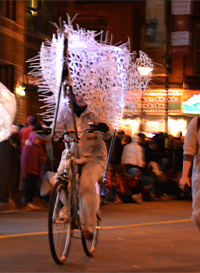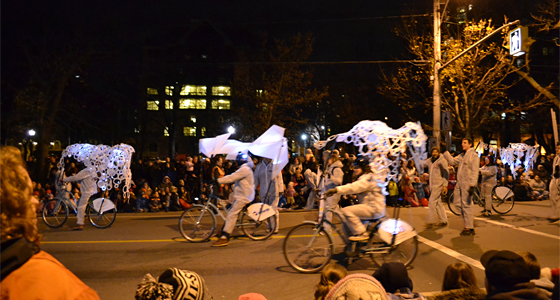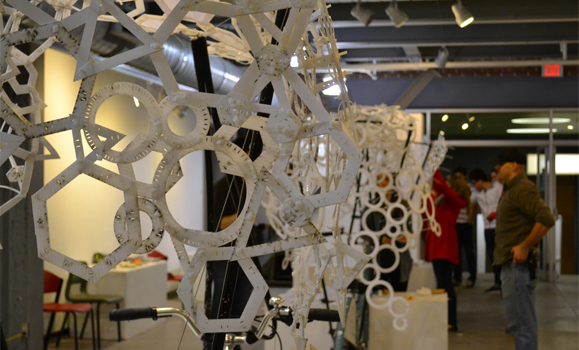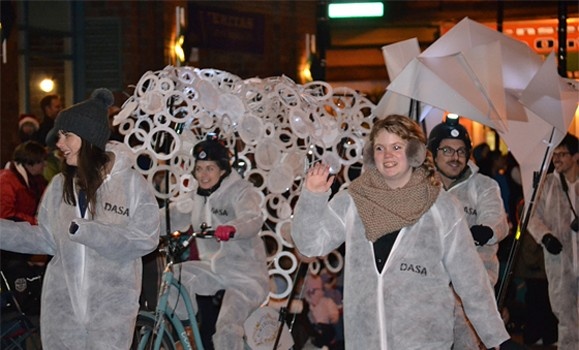Dal Architecture has become synonymous with holiday cheer, and this year was no exception as students from Architecture took to the streets for the annual Chronicle Herald Parade of Lights.
Saturday, November 17, magical patterns of light floated above bicycles as students paraded through downtown Halifax in hazmat-esque suits.
Building on last year’s success
 The designers of this convoy of bike-propelled canopies took their cue from last year's lighted orbs that were pulled on trailers behind bikes.
The designers of this convoy of bike-propelled canopies took their cue from last year's lighted orbs that were pulled on trailers behind bikes.
The goal of this year’s design was to create floats that acted as extremities of the bicycles. The challenge was rigging up floats using only the available attachments on the bikes, since the cycles were on loan from I ♥ Bikes.
‚ÄúIt was a lesson in what you can do with what you‚Äôve got,‚ÄĚ said architecture student and float design leader Beth MacLeod.
MacLeod and fellow design leader Brenda-Dale McLean, both currently in the final year of Dal’s Masters of Architecture program, offered a show-and-tell of the floats two days before the parade, as architecture students from all program years gathered to complete float construction.
Out of the fantasy world and into the fantastical
Planning for the floats began in mid-September and construction took place over half a dozen group building sessions.
MacLeod explained that the Nocturne festival was an inspiration for the floats.
‚ÄúWe wanted that fantastical aspect to reappear during the parade,‚ÄĚ she said. ‚ÄúWe were hoping for something a little more mystical and a little more awe-inspiring.‚ÄĚ
The visual concept for the floats was to experiment with space and movement, attempting to create the illusion of floating white canopies accented by people clad in head-to-toe white.
‚ÄúIt was great to experiment with a real build project. Usually we live in our little world upstairs,‚ÄĚ said MacLeod, pointing to the architecture classrooms.
The students have started an inventory of materials that can be reused for future floats and hope that sustainable practices throughout the year, such as collecting off-cuts from the laser cutter, can help reduce construction costs.
Donations from Ľ∆…ę÷Ī≤•, the Ľ∆…ę÷Ī≤• School of Architecture, I ‚ô• Bikes and Pierceys ‚ÄĒ who provided the white construction suits worn by parade walkers ‚ÄĒ made the parade entry possible.
The students took a trip to Cyclesmith to observe racing bikes and gain inspiration for how the frame of the bicycles could be extended to support the canopies.
‚ÄúBikes are a happy medium between people and semis,‚ÄĚ said MacLeod.

She added that not only do bicycles put the parade participants down on the kids’ level, but they are also something that many kids own themselves.
‚ÄúIf I see at least one kid smile, I‚Äôll be happy and it will be worth it,‚ÄĚ she said.
McLean agreed, saying, ‚ÄúIt‚Äôs about people having fun as we walk through.‚ÄĚ
The learning tradition
The canopies were constructed of intricate laser-cut chloroplast screens that were then covered in white fabric. Strings of white Christmas lights, LED clip-on lights and headlights provided the illumination for the floats.
The supporting frames for the canopies were constructed from PVC plumbing pipes, which provided the students with the opportunity to learn about plumbing connections.
McLean and MacLeod said that, along with their peers, they were able to apply their knowledge of structure systems while working with new materials such as aircraft cable ‚ÄĒ a departure from their usual work with wood.
Upper-year students used float construction as an opportunity to pass on skills to the younger classes. McLean and MacLeod also emailed last year’s architecture graduates to discuss the float design.
The project offered aspiring architects freedom of design and the chance to build a real world structure instead of a miniature scale.
‚ÄúIf we could use it in a class we could really do something phenomenal,‚ÄĚ said MacLeod, sharing her hopes for the future of the parade entry.
The Dal entry has been a part of the parade since 2003. Even the Dal Tiger takes part.
‚ÄúIt‚Äôs nice to have a sustained tradition,‚ÄĚ said MacLeod.
 The parade canopies, under construction in the School of Architecture.
The parade canopies, under construction in the School of Architecture.

